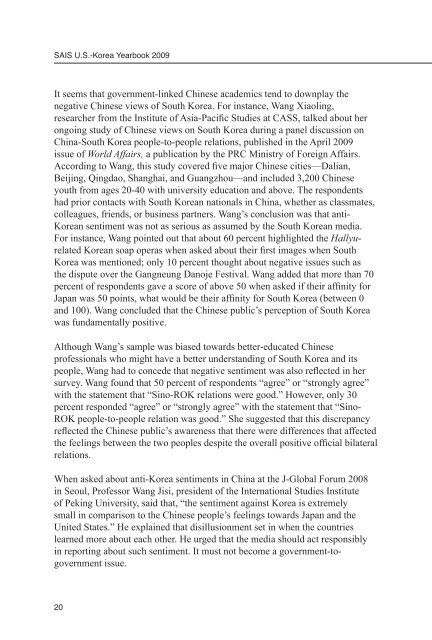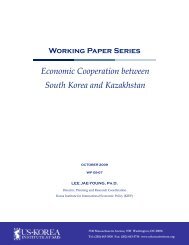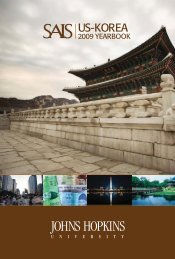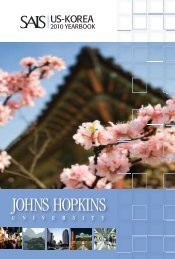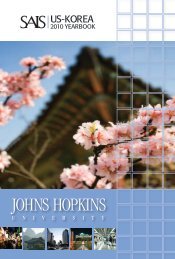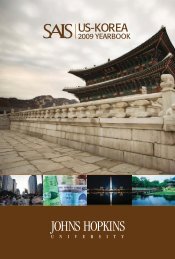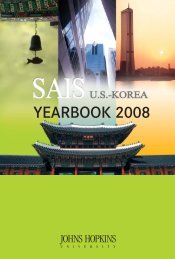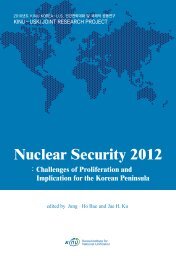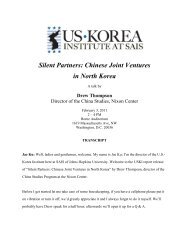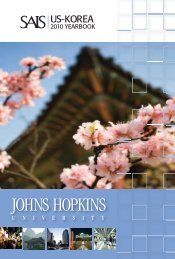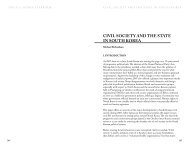US-Korea Institute at SAIS
US-Korea Institute at SAIS
US-Korea Institute at SAIS
- No tags were found...
You also want an ePaper? Increase the reach of your titles
YUMPU automatically turns print PDFs into web optimized ePapers that Google loves.
<strong>SAIS</strong> U.S.-<strong>Korea</strong> Yearbook 2009<br />
It seems th<strong>at</strong> government-linked Chinese academics tend to downplay the<br />
neg<strong>at</strong>ive Chinese views of South <strong>Korea</strong>. For instance, Wang Xiaoling,<br />
researcher from the <strong>Institute</strong> of Asia-Pacific Studies <strong>at</strong> CASS, talked about her<br />
ongoing study of Chinese views on South <strong>Korea</strong> during a panel discussion on<br />
China-South <strong>Korea</strong> people-to-people rel<strong>at</strong>ions, published in the April 2009<br />
issue of World Affairs, a public<strong>at</strong>ion by the PRC Ministry of Foreign Affairs.<br />
According to Wang, this study covered five major Chinese cities—Dalian,<br />
Beijing, Qingdao, Shanghai, and Guangzhou—and included 3,200 Chinese<br />
youth from ages 20-40 with university educ<strong>at</strong>ion and above. The respondents<br />
had prior contacts with South <strong>Korea</strong>n n<strong>at</strong>ionals in China, whether as classm<strong>at</strong>es,<br />
colleagues, friends, or business partners. Wang’s conclusion was th<strong>at</strong> anti-<br />
<strong>Korea</strong>n sentiment was not as serious as assumed by the South <strong>Korea</strong>n media.<br />
For instance, Wang pointed out th<strong>at</strong> about 60 percent highlighted the Hallyurel<strong>at</strong>ed<br />
<strong>Korea</strong>n soap operas when asked about their first images when South<br />
<strong>Korea</strong> was mentioned; only 10 percent thought about neg<strong>at</strong>ive issues such as<br />
the dispute over the Gangneung Danoje Festival. Wang added th<strong>at</strong> more than 70<br />
percent of respondents gave a score of above 50 when asked if their affinity for<br />
Japan was 50 points, wh<strong>at</strong> would be their affinity for South <strong>Korea</strong> (between 0<br />
and 100). Wang concluded th<strong>at</strong> the Chinese public’s perception of South <strong>Korea</strong><br />
was fundamentally positive.<br />
Although Wang’s sample was biased towards better-educ<strong>at</strong>ed Chinese<br />
professionals who might have a better understanding of South <strong>Korea</strong> and its<br />
people, Wang had to concede th<strong>at</strong> neg<strong>at</strong>ive sentiment was also reflected in her<br />
survey. Wang found th<strong>at</strong> 50 percent of respondents “agree” or “strongly agree”<br />
with the st<strong>at</strong>ement th<strong>at</strong> “Sino-ROK rel<strong>at</strong>ions were good.” However, only 30<br />
percent responded “agree” or “strongly agree” with the st<strong>at</strong>ement th<strong>at</strong> “Sino-<br />
ROK people-to-people rel<strong>at</strong>ion was good.” She suggested th<strong>at</strong> this discrepancy<br />
reflected the Chinese public’s awareness th<strong>at</strong> there were differences th<strong>at</strong> affected<br />
the feelings between the two peoples despite the overall positive official bil<strong>at</strong>eral<br />
rel<strong>at</strong>ions.<br />
When asked about anti-<strong>Korea</strong> sentiments in China <strong>at</strong> the J-Global Forum 2008<br />
in Seoul, Professor Wang Jisi, president of the Intern<strong>at</strong>ional Studies <strong>Institute</strong><br />
of Peking University, said th<strong>at</strong>, “the sentiment against <strong>Korea</strong> is extremely<br />
small in comparison to the Chinese people’s feelings towards Japan and the<br />
United St<strong>at</strong>es.” He explained th<strong>at</strong> disillusionment set in when the countries<br />
learned more about each other. He urged th<strong>at</strong> the media should act responsibly<br />
in reporting about such sentiment. It must not become a government-togovernment<br />
issue.<br />
20


